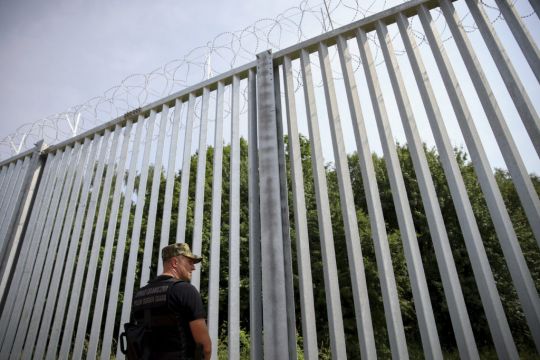A year after migrants started crossing into the European Union from Belarus to Poland, the country’s Prime Minister and top security officials have visited the border area to mark the completion of a new steel wall.
On Friday, Polish authorities will also lift a state of emergency along the border that has blocked journalists, rights workers and others from witnessing a human rights crisis.
At the very least, 20 migrants have died in the area’s freezing forests and swamps.
The Polish government characterises the wall as part of the fight against Russia, while human rights defenders see it as a huge double standard, where white, Christian refugees from Ukraine are welcomed but Muslims from Syria and other countries are rejected and mistreated.

“The first sign of the war in Ukraine was (Belarus President) Alexander Lukashenko’s attack on the Polish border with Belarus,” Polish PM Mateusz Morawiecki told a news conference.
“It was thanks to (our) political foresight and the anticipation of what may happen that we may focus now on helping Ukraine, which is fighting to protect its sovereignty,” Mr Morawiecki said.
As Poland opened its gates to millions of Ukrainians fleeing Russia’s invasion, work was well under way to build the 18-foot high wall along 115 miles of its northern frontier with Belarus. It still needs electronic surveillance systems to be installed.
It is meant to keep out asylum seekers of a different type: those fleeing conflict and poverty in the Middle East and Africa, who were encouraged to try their luck by Belarus’ authoritarian regime – a close ally of Russia – as part of a feud with the EU.
One of the asylum-seekers was 32-year-old Ali, who left Syria late last year after reading on social media that the easiest way into the EU was to fly to Belarus and walk into Poland.
Ali, from a village outside Hama in western Syria, flew to the Belarusian capital, Minsk, and set out to find an unguarded spot in the forest where he could sneak over into the EU.
“I was looking for a place where I can live in safety, away from the oppression and hopelessness back home,” he said in an interview with the Associated Press in Berlin.

Ali, who did not give his last name, fearing repercussions for his family, was not prepared for the violence and sub-zero temperatures that awaited him in the vast forests and swamps.
“There were nights when I went to sleep on the bare ground in the woods thinking I would not wake up again,” he said.
Human rights activists see a double standard in the different treatment of the neighbouring Ukrainian refugees – fellow Slavs who are mostly Christian, female and white – and those from the distant Middle East and Africa, many of whom are Muslims and male.
“If you give a lift to a refugee at the Ukrainian border you are a hero. If you do it at the Belarus border you are a smuggler and could end up in jail for eight years,” said Natalia Gebert, founder and CEO of Dom Otwarty, or Open House, a Polish NGO that helps refugees.
Belarus had never before been a key migration route into the EU – until Mr Lukashenko began encouraging would-be asylum-seekers in the Middle East to travel to Minsk.
Soon, people from Syria, Iraq, Yemen, Afghanistan and African countries flocked to the EU’s eastern edge, entering Poland and neighbouring Lithuania and Latvia.
EU leaders accused Mr Lukashenko of waging “hybrid warfare” in revenge for the bloc’s sanctions over the regime’s treatment of dissidents. Poland’s government says Russia is complicit, given Mr Lukashenko’s alliance with Russian President Vladimir Putin.
Though migration slowed in the winter, people continued to try to enter the EU through Poland, a route seen as less dangerous than crossing the Mediterranean Sea, where many have drowned in past years, Ms Gebert said.

Ali, whose small make-up business in Syria was destroyed when Sunni extremists learned he belonged to the Alawite religious minority, says he got pushed back six times by Polish border guards.
But Belarusian guards beat him, stole his money and forced him to take off all his clothes in the middle of the winter. He wanted to give up and return to Minsk, but the guards would not let him. They made him and others lie on the cold ground, screamed at them, approached closely with a snarling dog and kicked Ali repeatedly in the chest, he said.
A Human Rights Watch report this month said Poland “unlawfully, and sometimes violently, summarily pushes migrants and asylum-seekers back to Belarus, where they face serious abuses, including beatings and rape by border guards and other security forces”.
Amnesty International has also detailed serious human rights abuses.
While some Poles support the government’s tough stance, many border region residents have throughout the winter and spring sought to help migrants trapped in the forest, several requiring medical help.
Ali spent 16 days in the forests, before he and others used were able to open a hole in a border fence. Some villagers gave him food and water, but soon he was apprehended by police and taken to a detention centre.
Over the next three months, he was moved through several closed camps.
In March, he was handed his papers and taken to the Debak centre for foreigners in Otrebusy, southwest of Warsaw, where he said he was told: “Go away, go to Germany.”
Ali arrived in Berlin in April and applied for asylum. Rights activists and psychologists have documented his account and also those of other asylum-seekers who say they suffered abuse by both Belarusian and Polish border guards.
“I feel better here. People call me by my name again,” Ali said. “But I’m worried all the time that the Germans will send me back to Poland.”







